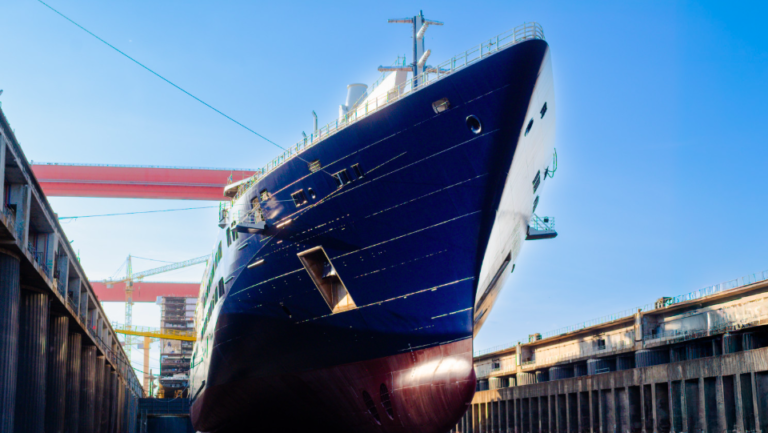Orient Express Sailing Yachts has celebrated the float-out of Orient Express Corinthian. This operation formally ushered the world’s largest sailing yacht from structural build into systems-integration and finishing phases, marking its official debut on the water.
It came after four and a half months of assembly by the teams at Chantiers de l’Atlantique in Saint-Nazaire. Built from fourteen structural blocks and crowned with three balestrons rigs, the yacht was guided by tugs along a set course, before mooring at the quay to begin its final outfitting and finishing phases.
The yacht sets sail in June 2026, cruising first in the Mediterranean and Adriatic that summer, before a transatlantic to the Caribbean. Orient Express Olympian is scheduled to sail in the summer of 2027.
At 220m (722ft) long and with gross tonnage of 26,200gt, Orient Express Corinthian will be the world’s largest contemporary sailing yacht. The build was announced back in 2023 when, 140 years after the launch of its first luxury trains, Orient Express opened up about the French partnership between hospitality provider Accor and shipbuilder Chantiers de l’Atlantique.
The shipbuilder’s in-house designed SolidSail wind sail system will utilise three 100m tall lightweight masts each of which will be rigged with 1500m2 Solid Sail/AeolDrive rigid but foldable sails. The engine will be powered by liquefied natural gas (LNG) and there are plans to use green hydrogen.
It’ll have 54 suites measuring on average 70 square metres and feature two swimming pools, an amphitheatre-cabaret and a private recording studio.
And, Bio-uv Group (which specialises in water treatment) has supplied its Bio-Sea ballast water treatment system.
After factory acceptance trials for the chemical-free unit were successfully completed, installation took place at the St. Nazaire shipyard.
When the yacht is operational next year, the UV-based Bio-Sea system is expected to treat water flow rates up to 135 m3/h. Chantiers de l’Atlantique has used the Bio-uv group’s ballast water treatment systems in more than twenty installations over the past decade or so.
“Our ballast water treatment systems resonate with environmentally conscientious ship owners and builders because of the compact, low energy consuming reactor technology we have developed,” says Maxime Dedeurwaerder, Bio-uv Group’s sales director for solutions. “The bio-Sea ‘B’ unit for the Accor ships, for instance, needs only one UV reactor, optimising space and energy saving efficiency without any impact on ballast water treatment performance to limit invasive species proliferation.”


